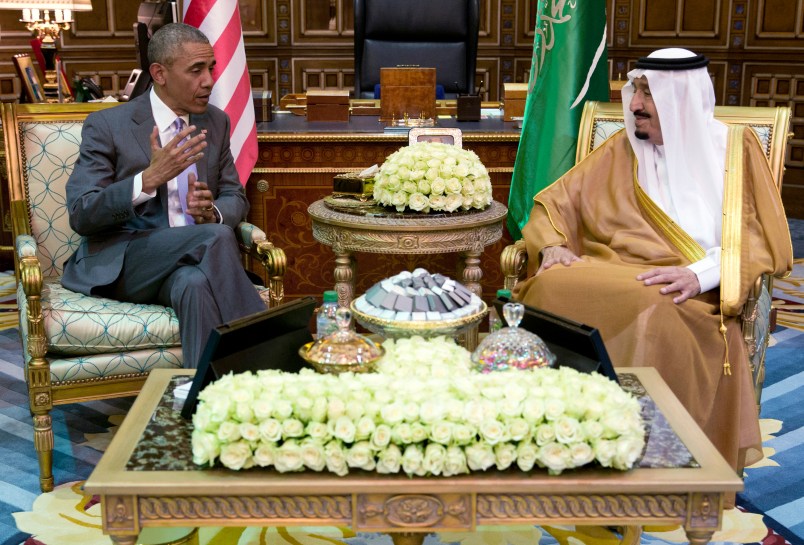RIYADH, Saudi Arabia (AP) — President Barack Obama opened a brief trip to Saudi Arabia on Wednesday with a one-on-one meeting with King Salman in Riyadh. The visit for a Persian Gulf summit comes against the backdrop of increasingly strained U.S. relations with the Saudis, who remain deeply opposed to his outreach to Iran and skeptical of his approach to Syria.
Under crystal chandeliers, the Saudi monarch greeted Obama in a grand foyer at Erga Palace, where the two walked slowly to a reception room as the small of incense wafted. The two offered polite smiles as they sat down side by side for pictures at the start of their private meeting.
“The American people send their greetings and we are very grateful for your hospitality, not just for this meeting but for hosting the GCC-U.S. summit that’s taking place tomorrow,” Obama said, referring to the six-nation Gulf Cooperation Council summit that starts Thursday.
King Salman, speaking thru a translator, offered similarly gracious words for the president, who is paying his fourth trip here for face-to-face meetings and photos with royal rulers since becoming president.
“The feeling is mutual between us and the American people,” the king said.
The president was slated to spend little more than 24 hours in the Saudi capital before heading on to visits to London and Hannover, Germany.
In addition to Saudi Arabia, the United Arab Emirates, Qatar, Kuwait, Oman and Bahrain are participating in the regional summit, which the White House said would focus on regional stability, counterterrorism including the fight against the Islamic State and al-Qaida, and Iran. Talks are also expected to address the Saudi-led military campaign against Shiite rebels and their allies in neighboring Yemen.
Stepping off of Air Force One earlier at King Khalid International Airport, Obama was greeted on a red carpet not by King Salman but by Prince Faisal bin Bandar bin Abdulaziz Al Saud, the governor of Riyadh. Before Obama landed, Saudi state television did not immediately air Obama’s arrival, but showed the king greeting other senior officials from Gulf nations arriving for the summit.
U.S. officials have expressed hope the latest meeting will build on last year’s Camp David summit, though they acknowledge differences remain between the U.S. and Saudi Arabia.
The Sunni Muslim-ruled kingdom — the world’s biggest oil exporter and the largest buyer of American-made weapons — sees Shiite-led Iran as its main rival. Saudi leaders are concerned that concessions granted to Iran in last year’s nuclear deal will embolden it to pursue what the Saudis view as aggressive meddling throughout the region.
Salman’s reign has overseen a more assertive foreign policy, with Saudis venturing into Yemen and pushing the U.S. to take more aggressive moves to overthrow Syrian President Bashar Assad. Saudi Arabia and Iran back opposing sides in Syria’s civil war and in the Yemen conflict, where the U.S. military is providing refueling and other logistical help to the Saudi-led war effort.
Obama’s recent comment that the Saudis and Iranians should “share the neighborhood” roiled officials in Riyadh. Still, in a sign of the importance of the Saudi Arabia to the U.S. policy in the region, this is Obama’s fourth trip here for face-to-face meetings and photos with royal rulers
Ahead of Obama’s trip, a group of U.S. senators called on the president to press Saudi Arabia on human rights issues during the visit and raise the cases of two imprisoned advocates, blogger Raif Badawi and a man who defended him, rights activist Waleed Abu al-Khair. Also behind bars is Palestinian poet Ashraf Fayadh, who was sentenced to death for apostasy but later had his sentenced reduced on appeal to prison and lashes.
Saudi Arabia in early January carried out its largest mass execution in years, putting 47 people to death, including prominent Shiite cleric Sheikh Nimr al-Nimr. That move trigged an angry reaction from Sunni-ruled Saudi Arabia’s Shiite rival Iran, where protesters set fire to two Saudi diplomatic missions inside Iran. Saudi Arabia and its Gulf allies responded by severing or downgrading diplomatic ties with Iran.
Maya Foa, death penalty director for the human rights group Reprieve, said Obama’s visit “comes amid a huge surge in repression in the kingdom.” The London-based group is urging the president to raise the case of Al-Nimr’s nephew, Ali al-Nimr, and two other men on death row who were arrested while under 18 during protests in the kingdom’s oil-rich east.
The White House said concerns about inclusive government and improved rights were on his agenda to discuss with the Saudis and the other Gulf leaders.
Saudi Deputy Crown Prince Mohammed bin Salman, who is also the kingdom’s defense minister, said ahead of Obama’s visit that the Gulf and the U.S. must work together to confront challenges including terrorism, instability and what he described as Iranian interference into regional countries’ affairs.
___
Schreck reported from Dubai, United Arab Emirates. Associated Press writer Abdullah al-Shihri in Riyadh contributed to this report.
___
Follow Kathleen Hennessey on Twitter at http://twitter.com/khennessey and Adam Schreck at http://www.twitter.com/adamschreck .
Copyright 2016 The Associated Press. All rights reserved. This material may not be published, broadcast, rewritten or redistributed.



